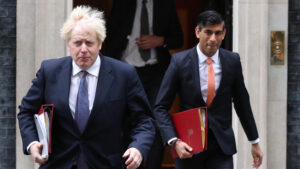
The government borrowed £18.6 billion last month, £5.6 billion less than in April last year and below expectations.
City economists had forecast borrowing of £18.8 billion and the Office for Budget Responsibility’s estimate was for £19.1 billion. However, it is the still the fourth highest borrowing for the month since records began in 1993.
The government was helped by a £5.5 billion rise in taxes to £50.2 billion, including £1.4 billion from the increase in National Insurance. Total receipts rose to £70.2 billion, £9.9 billion more than in the same month last year.
While the government continued to be helped by the drop in spending on Covid-19, the rise in inflation to 40-year highs is pushing up the cost of servicing debt. Debt interest payments were £4.4 billion. Of this, £3.9 billion was down to the rise in the retail prices index, which determines payouts on index-linked gilts, to 11.1 per cent last month.
Michal Stelmach, senior economist at KPMG, said: “Following the latest spike in RPI inflation, we now expect monthly interest spending to reach an eye-watering £16 billion in June, exceeding the annual day-to-day budget of the Home Office.”
Rishi Sunak, the chancellor, said: “While we are doing what we can to help families deal with rising prices, inflation is also pushing up our spending on debt interest, which is expected to reach £83 billion this year. We must take a balanced and responsible approach to support people now, while also not burdening future generations, and we’re on track to drive public debt down by 2024-25.”
The chancellor announced £22 billion of temporary support to cushion the cost-of-living squeeze on households in his spring statement but is under pressure to do more. He is reported to be considering a windfall tax on electricity companies as well as oil and gas suppliers to help households cope with the rise in energy prices.
Energy bills jumped 54 per cent last month for millions of households whose bills are determined by the energy price cap. Food prices are also rising as a result of the war in Ukraine.
Paul Dales, chief UK economist at Capital Economics, said: “The lower-than-expected public borrowing of £18.6 billion in April … and the downward revisions to borrowing in 2021-22 will only add to the pressure on the chancellor to go big when finalising the imminent support package for households. We think any support will be small and targeted rather than big and widespread.”
Samuel Tombs, chief UK economist at Pantheon Macroeconomics, expected public borrowing to total about £110 billion this year, “above the OBR’s £99.1 billion forecast, even before any possible further measures to support households are taken into account”.
Public sector net debt stood at £2,347.7 billion at the end of April, about 95.7 per cent of gross domestic product, 0.9 percentage points higher year on year.
The Office for National Statistics has also revised down its estimate of borrowing in the year to the end of March to £144.6 billion, from £151 billion previously. It remained above the OBR’s forecast of £127.8 billion.
Read more:
UK borrowing falls in April as inflation raises debt costs